
Related
Israel’s tightened blockade of a million and a half Palestinians in the Gaza Strip is now entering its third week. On Monday, the Israeli navy seized fifteen Palestinian fishermen and three international activists off the coast of Gaza. The fishermen were released, but the activists remain in an Israeli jail. We speak to Darlene Wallach from inside the Masiyahu Prison near Tel Aviv.
Transcript
AMY GOODMAN: Israel’s tightened blockade of a million and a half Palestinians in the Gaza Strip is now entering its third week. Tel Aviv rebuffed calls Thursday from United Nations Secretary-General Ban Ki-moon to reopen the crossings into Gaza for humanitarian aid. Israeli government officials cited continuing Palestinian rocket fire as the reason for closing the crossings.
Residents of Gaza are running out of essentials, like food, medicines and fuel, as a result of the almost continuous blockade imposed November 4th.
Meanwhile, the fifteen Palestinian fishermen seized by the Israeli navy off the coast of Gaza were released on Wednesday. The three international volunteers accompanying the fishermen, however, remain in a prison near Tel Aviv.
American Darlene Wallach, Italian Vittorio Arrigoni, and Scottish Andrew Muncie had arrived by boat into Gaza in late August as part of the first Free Gaza delegation. They remained in Gaza working with the International Solidarity Movement alongside Palestinian fishermen, documenting any harassment by the Israeli navy.
The three internationals are reportedly beginning a hunger strike today to protest their detention. They are also demanding the Israeli navy release the Palestinian fishing boats they confiscated this week.
US citizen in detention, Darlene Wallach, joins me now from a phone inside the prison near Tel Aviv. Welcome to Democracy Now!, Darlene.
DARLENE WALLACH: Thank you very much. Thanks for calling me.
AMY GOODMAN: Where exactly are you being held?
DARLENE WALLACH: I’m in a — it’s in a men’s prison, but inside the men’s prison there’s a compound for women. And the compound is for people who are illegally in Israel because their visa, work visas ran out. So my question is, why am I here? I was kidnapped at gunpoint by the fourth largest military in the world, and I was on a Palestinian fishing boat in Palestinian fishing waters. So it doesn’t make any sense why I’m here, why I’m being held.
AMY GOODMAN: Explain exactly what you were doing and the scene when you were arrested.
DARLENE WALLACH: I was on a Palestinian fishing boat that I’ve been on numerous times. And we accompany the Palestinian fishing boats in their waters, where they have the international right to fish, so that the Israeli navy won’t shoot and kill or arrest the Palestinian fishermen.
So what made it different this time is, it seemed to me they were specifically targeting the internationals, because they released the Palestinian fishermen to their homes. And they also confiscated the fishing boats. And the way that they arrested us was very different than how they normally arrest the fishermen. So, normally, they force the fishermen to strip to their underwear, jump in the water and swim to the Israeli navy boats. And this time they brought Zodiac boats, and the frogmen boarded each Palestinian fishing boat. And the first person taken was Andrew. I saw him being taken. And then they took the fishermen off of that boat. Then they came to the boat I was on and took me off the boat.
And so, I don’t know — I didn’t know what happened to the fishermen. I was very concerned about their safety and what Israel might do to them. And I’m very, very concerned about the fishing boats, because in the past what Israel does is they sink the boats or they damage the boats, like taking the engines off, or steal all the equipment. So I’m very concerned about what’s going to happen to the fishing boats. That’s their livelihood. I mean, they said fifteen fishermen. Well, there’s more than just those fifteen that work on each boat. So the livelihood of all those people now has been destroyed. That’s how many families now? And the families tend to be large. How many families now have no income, and there’s no employment, because they have no fishing boats to go out on? It’s really just disgusting, despicable, deplorable. And I want the world to speak out and tell Israel to stop.
AMY GOODMAN: Now, those fifteen fishermen have been released. Why haven’t you been released?
DARLENE WALLACH: I guess the plans are to deport us. And my understanding is, when they deport you, they deport you to where you came from. Since I came from Gaza, I want to be released to Gaza. It sounds like they have no plans on doing that. I don’t know why they’re holding me. It seems like they violated international law in many different ways. And so, I don’t know. I can’t answer that. But then, if you try to talk to Israel, it doesn’t necessarily mean you’re going to get the truth from them.
AMY GOODMAN: How did you get into Gaza, Darlene Wallach?
DARLENE WALLACH: How did I get to Gaza?
AMY GOODMAN: Yes.
DARLENE WALLACH: I was on the Liberty, one of the two boats that — one of the first two boats that went to Gaza from Cyprus. And I actually was with the Liberty on the way to Cyprus. And so, it was a wonderful trip. It was a wonderful boat. It was an amazing, amazing experience.
The welcome that we got in Gaza, it was just overwhelming. My emotions come up, because it was thousands of people just so happy to see, at least token-wise, symbolically, the siege broken. It was the first time in forty-one years that, from Cyprus, a stamp on a piece of paper said a boat was leaving Cyprus for Gaza. And it was like an amazing trip. And it’s been amazing to be in Gaza to work in solidarity with the Palestinians. They’re amazing, kind, warm, loving people. And I — for me, just being out on the fishing boats and the stress, I don’t understand how they can go out there day after day with the stress, knowing at any time they could be killed, that any time their boats could be taken, at any time they could be arrested or shot.
AMY GOODMAN: Darlene Wallach, I wanted to remind our listeners and viewers about these boats, that the one — one of them you describe, the Liberty
, that’s challenging the blockade. We were able to reach people on the boat in the first trip that was coming over. We spoke to the former prime minister of Britain’s sister-in-law, Tony Blair’s sister-in-law. We spoke to Jeff Halper, the Jewish Israeli who is challenging housing demolition. Mairead Maguire was on one of the trips; she is the Nobel Peace Prize-winner from Ireland. These are the boats that you’re describing that —- not to be confused with the fishing boats, but are challenging the blockade.
DARLENE WALLACH: That’s correct. That’s correct.
So, I want to make sure that people understand, when they talk about the ceasefire, Israel has violated the ceasefire from day one; before it even was created, they were violating it. The ceasefire supposedly was going to lift the blockade and allow goods and services and food and fuel and that kind of thing, and Israel has never lifted that blockade.
Israel has violated the ceasefire every day by, when the fishermen go out to fish, Israel navy comes and shoots at the boats. They use high-pressure water power; they have a water cannon that they shoot at the boats that damages the boats, injures people. They’ve cut the cables. The fishermen have lost their fishing nets.
On a daily basis, the farmers who try to go out and farm their fields get attacked. So, Israel created this buffer zone, 300— to 500-meters wide, along the whole length of the Gaza Strip. And that was done around May 1st. And that was a desert area, that whole area, where they demolished all kinds of crops, homes, wells. And in the crops, it was like citrus, dates, olives. Any kind of crop they had, it was all demolished. And farmers now are trying to go back out and start, you know, planting their fields and being able to harvest their fields. And we’ve been accompanying them.
And even just standing out there in the fields, where it’s just farmers, obviously knowing with any kind of military — no militants, just farmers, just people trying to tend their fields — the Israeli military comes by in their jeeps and gets out and starts shooting. So we’re a presence to be witness to that. We’re a presence to make sure that people aren’t killed. And when they start shooting, we’re standing out in the fields with our florescent vests on, some of us. And we stand there until the Israeli military leaves. We don’t back off. When they start shooting, we stand in the fields and having the bullets, you know, come around us, over our heads or by our feet.
AMY GOODMAN: Darlene Wallach, are you beginning a hunger strike today at the jail?
DARLENE WALLACH: I actually started a hunger strike last night. I didn’t eat dinner. And for me, they had someone talk with me yesterday, and saying that they are not going to allow me to die. So I don’t know what that means. For me, I’m still in the prison, and I still have my cell phone. Andrew Muncie was taken into isolation today, and his phone was taken from him.
AMY GOODMAN: I want to thank you, Darlene Wallach, for joining us, speaking to us — the name of the prison you’re in near Tel Aviv?
DARLENE WALLACH: I always forget the name of it. It starts with an “M.” And it’s a new prison. It’s a men’s prison, but within the men’s compound, they have a compound for women.
And I just want to make sure people know that this blockade on Gaza, this siege, is really, really horrendous, what it’s doing. I mean, the flour mills are having to shut — the last flour mill shut down, because there’s no fuel. I mean, if people can’t buy bread, what are they going to eat? This is very, very, very serious. There’s 500 students with scholarship that can’t get out to go continue their university education. And there’s 3,000 students that are accepted to universities, that they’re losing their administrative entrance into the universities, because Israel will not allow them out. And 258 people have died, because Israel refuses to let them out to get medical care. And this is [inaudible].
AMY GOODMAN: Darlene Wallach, I want to thank you for being with us. We’re going to turn next to the South African Archbishop Desmond Tutu, who speaks about the blockade of Gaza. Darlene Wallach is speaking to us from the Masiyahu Prison near Tel Aviv. Again, executives from the Associated Press, Reuters, New York Times, BBC, CNN and other news organizations have signed a letter criticizing the Israeli government’s decision to ban journalists from entering Gaza.

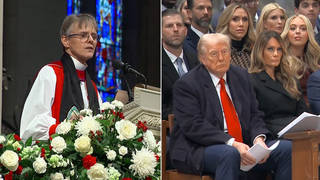
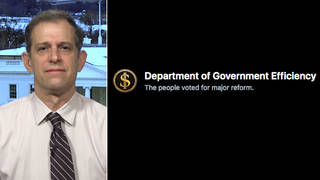
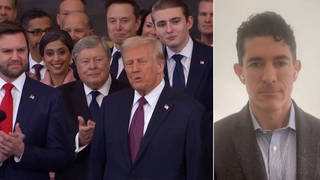
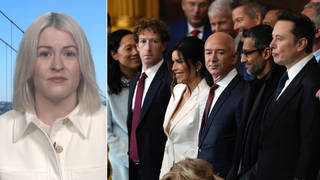






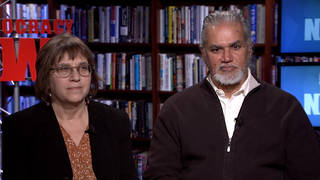
Media Options